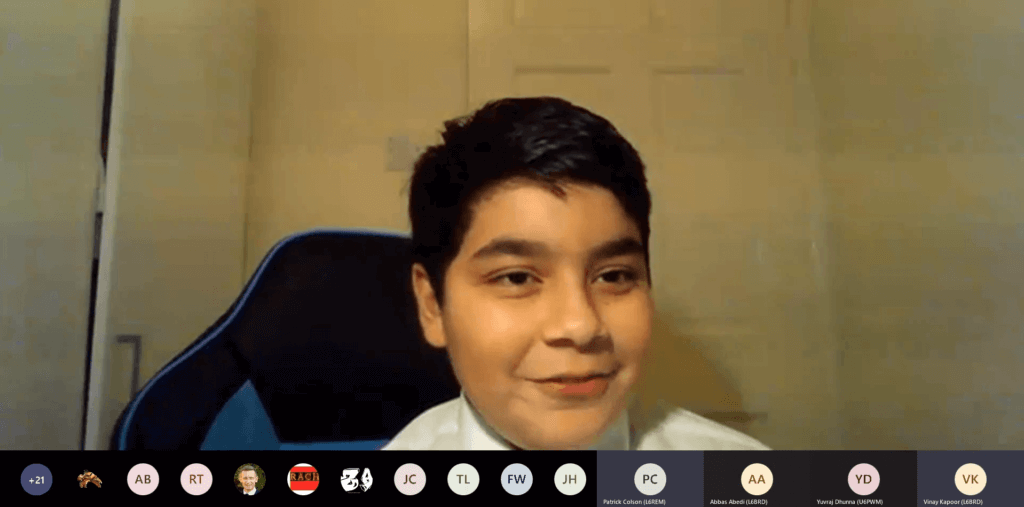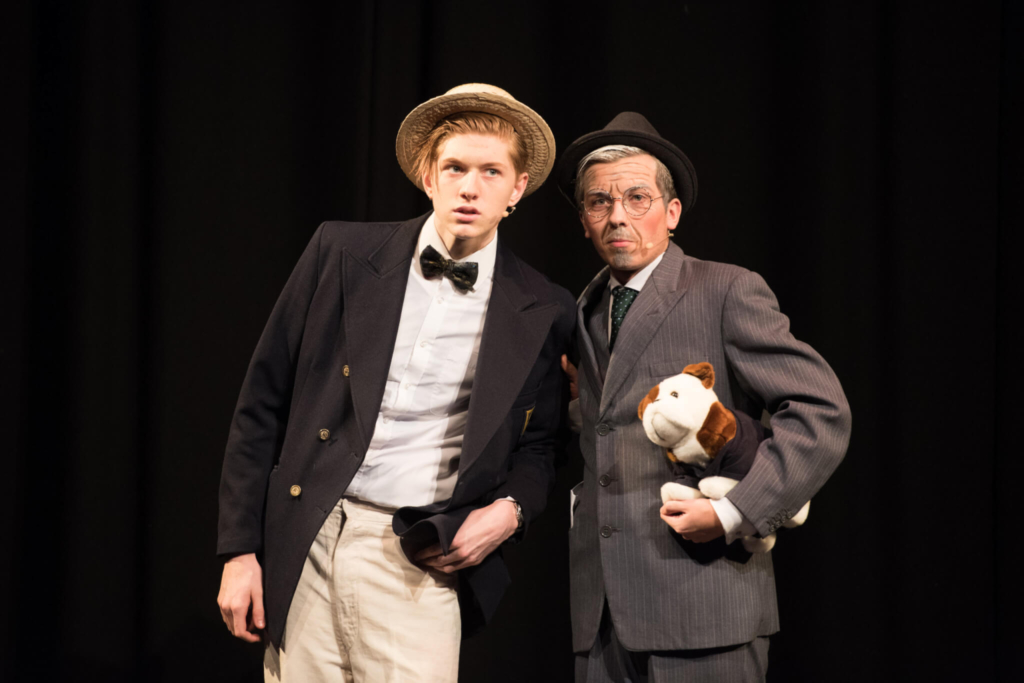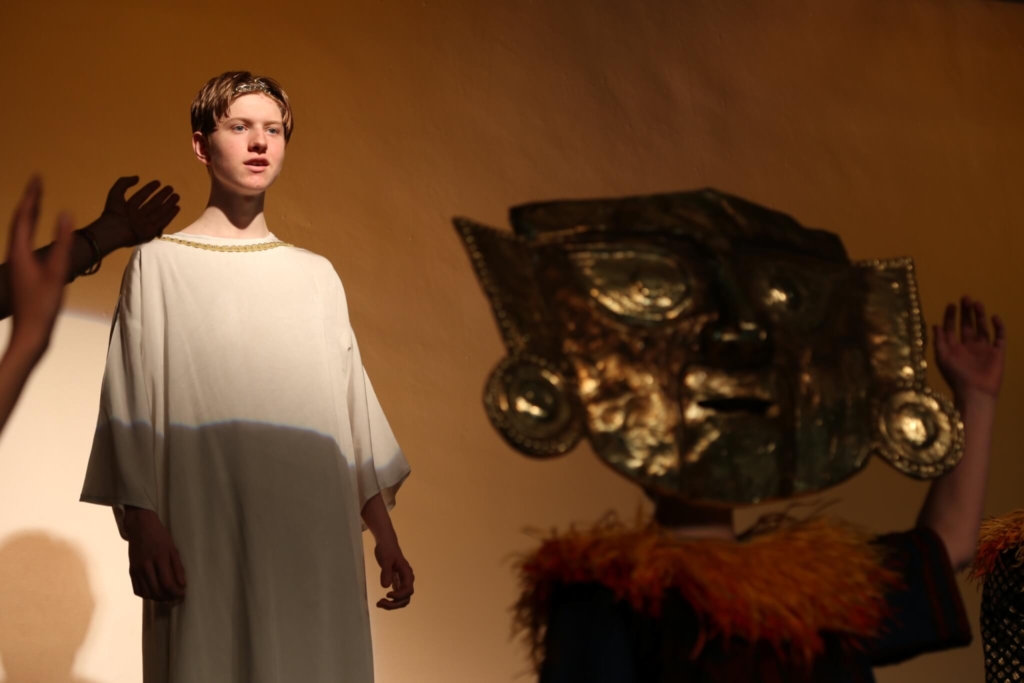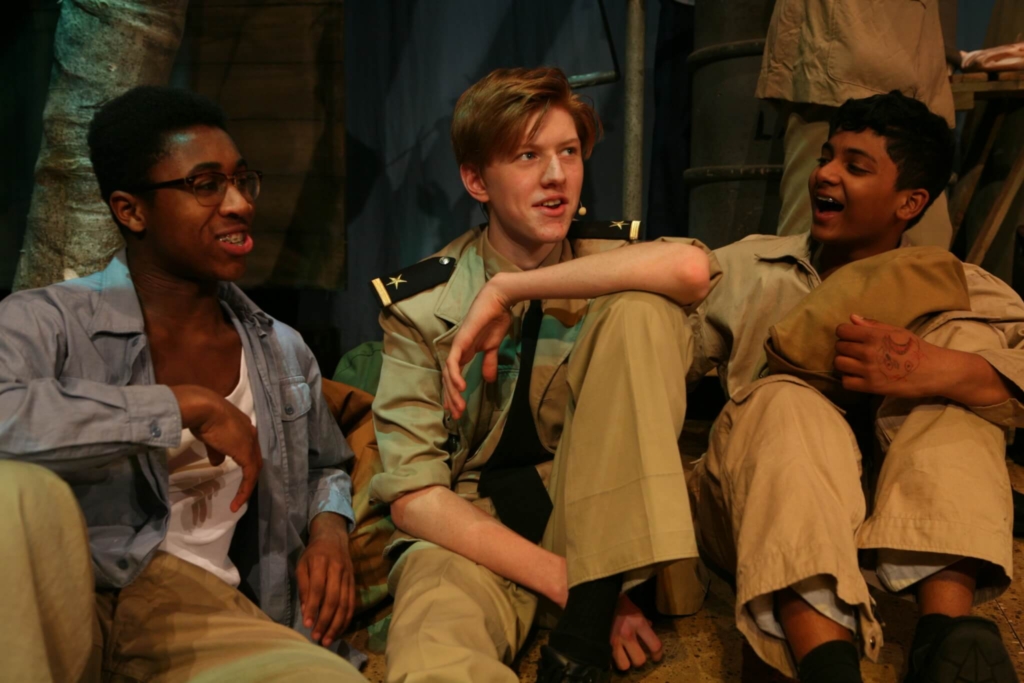14 January 2021
Music, space, home learning and beautiful numbers on the menu as John Lyon Academic Society enters 2021
The first John Lyon Academic Society meeting of the new year has seen four pupils take their peers on a journey from the brain to the far reaches of the universe, as they presented on a variety of subjects.
The Society — which sees students talk to students — allows each speaker to explore a subject they find fascinating and have researched beyond the curriculum.
The meeting on Monday 11th January, chaired by Lower Sixth students Abbas Abedi and Vinay Kapoor, included four presentations from pupils ranging in age from Year 7 to the Sixth Form.
Opening the session, Lower Sixth A-Level student and accomplished musician Patrick Colson spoke on Music and the Brain, examining the science behind the music we listen to and how it can affect how we feel. Patrick talked about compressions, rarefactions, amplitude and frequency as the ‘physics of music’ and that our brain interprets musical signals almost as if it were a second language, that we can all understand.
He went on to talk about the music we like releasing the ‘reward’ hormone dopamine, but said that our relationship to music is so complex and nuanced that there is no hard science that can truly explain how and why we react to music in the ways we do.
Year 7 pupil Mahdi Mossahar looked at the possibility of finding another planet for humans to live on, in his talk The Future of Space Exploration. He set out that in humans’ brief time on earth (a mere six million years) we had done much damage to our planet through burning fossil fuels and destroying habitats, so much so that we might want to consider finding another planet to call home.
With the need for a source for water, atmosphere and proximity to a stable star all crucial, he said the options were limited, and that the best possible options were well out of our reach, the best planets some 2,500 light years away. Whilst a fascinating prospect, Mahdi concluded protecting our own Earth through the use of a variety of renewable energy resources was the best, and perhaps only, option.

Racheith Rajan, a Year 8 pupil, offered his thoughts on home learning, presenting research carried out by academics around the world as well as the results of a survey of pupils he had carried out himself.
In his talk, Making Online Education More Effective, According to a Pupil, he thought that a discussion either for or against home learning was less useful than trying to find the best ways to conduct the remote lessons we have become used to in the past year during the Covid-19 pandemic, with the hope of making it comparable with normal classroom learning.
He set out five areas for discussion, including topics of teacher feedback, pupil participation, making work seem more like a game with competition and reward, time for offline discussion, and, perhaps most crucially, ways to make online learning more fun.
Finally, Lower Sixth student Fares Shehata gave a detailed mathematical examination of The Numbers You Won’t Find on the Number Line — those described as having a ‘bad reputation’, the so called imaginary numbers.
Like in biology, where there is a classification system for all organisms, numbers can be similarly described, from the natural numbers (N) that we all know and use every day, through Integers (I), Rational Numbers (Q) and Real Numbers (R) – all mathematics that had been developed over centuries from as early as the Ancient Egyptians, via the Ancient Greeks, Mayans and India, to the more modern European mathematicians. But beyond this, there is a further classification of numbers, Lateral Numbers (i), described by some as imaginary. Seen by many as being impossible, Fares described these numbers as beautiful and how the mathematics of Lateral Numbers is used today by electrical engineers and in quantum mechanics.
John Lyon Academic Society is part of the John Lyon Excellence Programme, which provides an opportunity for all pupils, no matter their academic ability or age, to maximise their potential to learn and to discover their passion.


























































 We provide a wide range of sporting activities and opportunities for all pupils.
We provide a wide range of sporting activities and opportunities for all pupils. At our Prep School we concur with educational theorists who emphasise the importance of the creative mind and ‘emotional intelligence’ and ‘wellbeing’ – the need to develop the whole personality and our pupil’s imaginations especially. Drama has the power to liberate the mind.
At our Prep School we concur with educational theorists who emphasise the importance of the creative mind and ‘emotional intelligence’ and ‘wellbeing’ – the need to develop the whole personality and our pupil’s imaginations especially. Drama has the power to liberate the mind. We encourage our pupils to become healthy, independent and responsible members of society.
We encourage our pupils to become healthy, independent and responsible members of society.  At our Prep School, Computing covers the use of electronic technology in all its forms, including computers and other communication devices.
At our Prep School, Computing covers the use of electronic technology in all its forms, including computers and other communication devices. • What is religion?
• What is religion?
 Art is an integral part of our Prep School’s curriculum, providing our pupils with a unique means of expressing their ideas by allowing them to explore new thoughts and give life to their creative minds.
Art is an integral part of our Prep School’s curriculum, providing our pupils with a unique means of expressing their ideas by allowing them to explore new thoughts and give life to their creative minds. History is taught throughout the School and pupils are encouraged to find out about events and peoples.
History is taught throughout the School and pupils are encouraged to find out about events and peoples. Planet Earth is our only home. It is an mind-blowing, diverse and constantly changing place of awesome beauty and power.
Planet Earth is our only home. It is an mind-blowing, diverse and constantly changing place of awesome beauty and power.  French is the language of our nearest neighbours, probably the easiest foreign language for English speakers to learn and, after English, one of the most widely-learned languages worldwide.
French is the language of our nearest neighbours, probably the easiest foreign language for English speakers to learn and, after English, one of the most widely-learned languages worldwide. The core of every science lesson at our Prep School is about developing every pupil’s curiosity in the world around them.
The core of every science lesson at our Prep School is about developing every pupil’s curiosity in the world around them.  Mathematics is a key subject for children of all ages at our Prep School.
Mathematics is a key subject for children of all ages at our Prep School. English is taught using lively and creative methods through a variety of texts and resources incorporating ICT from Pre-Prep onwards.
English is taught using lively and creative methods through a variety of texts and resources incorporating ICT from Pre-Prep onwards.